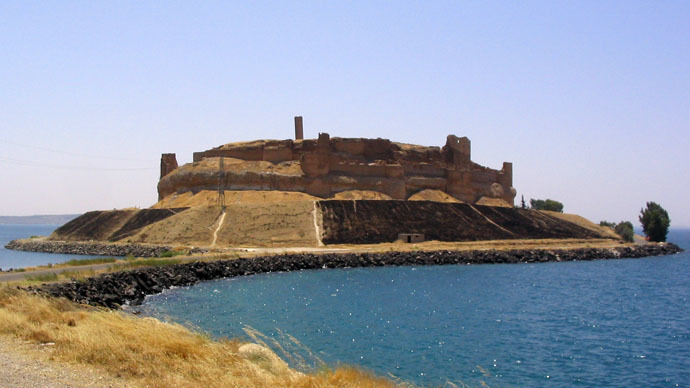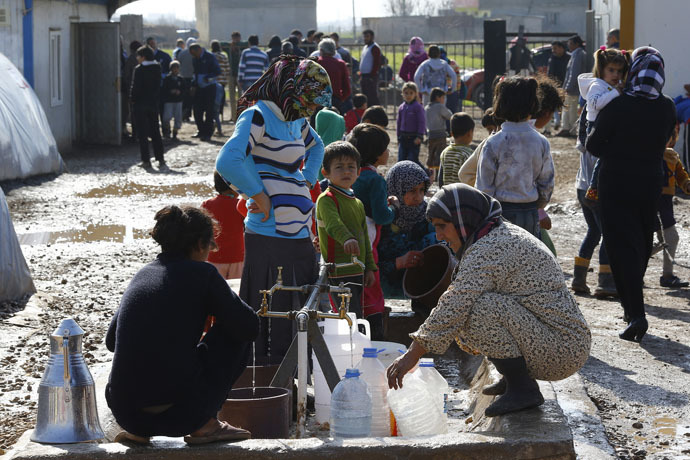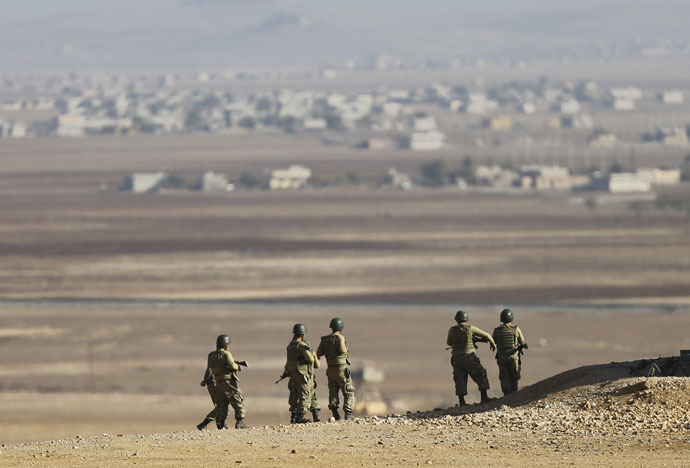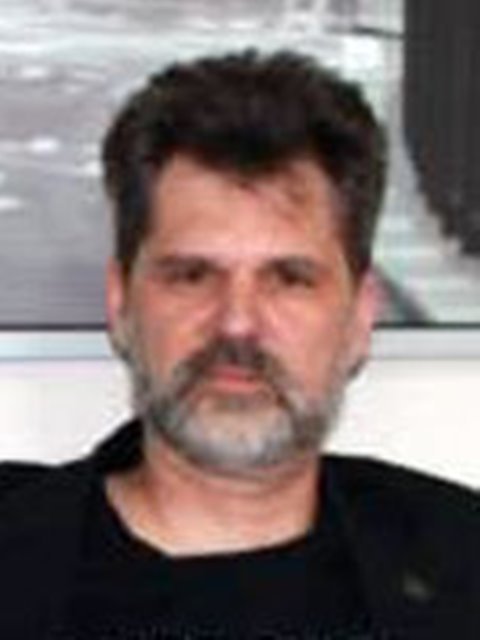The abduction of Suleyman Shah

Turkey, ruled by the Justice and Development Party (or AKP), has over the past years openly opposed Bashar al-Assad's rule in Syria. Still, it took Recep Tayyip Erdogan many years to actually send his troops next door . . . until late February that is.
About three weeks after the lifting of the siege of Kobani right across the Turkish-Syrian border and just days after having agreed to train a new "Syrian rebel" force in the central Anatolian town of Kırsehir, Turkey's AKP-led government ordered its Armed Forces (or TSK, in its acronymized Turkish form) to perform a rather spectacular operation that began late Saturday and ended in the early hours of Sunday (21-22 February 2015).
Turkish troops crossed into Syrian territory to remove the remains of "the grandfather of Sultan Osman, the founder of the Ottoman dynasty" (an obscure historical figure called Suleyman Shah) as well as the Turkish soldiers guarding his tomb inside Syria.
READ MORE: Turkish military conduct ground op in Syria to evacuate soldiers from holy place
This strange rescue operation received the name 'Shah Firat'. The existence of this Turkish exclave on Syrian soil goes back to 1921 when Ankara's Grand National Assembly, then constituting the country's provisional government, signed an agreement with the French, bringing an end to hostilities and demarcating the territories held by the provisional Turkish government and France, respectively. The document's 9th article deals specifically with the tomb of Suleyman Shah, stipulating that the building and its grounds "shall remain, with its appurtenances, the property of Turkey, who may appoint guardians for it and may hoist the Turkish flag there.”
The tomb has been in the Turkish media for many months now. As long ago as August 2013, the then-still-PM Tayyip Erdogan declared that the "tomb of Suleyman Shah [in Syria] and the land surrounding it is our territory. We cannot ignore any unfavorable act against that monument, as it would be an attack on our territory, as well as an attack on NATO land . . . Everyone knows his duty, and will continue to do what is necessary.”
As such, the Islamic State (or IS, then still primarily known as ISIS/ISIL) had been threatening the Turkish exclave ever since March 2014. In fact, in the course of the following month the AKP leadership even appeared willing to organize a false flag attack on the tomb to garner popular support in the then-upcoming local elections. In the end, however, a leaked recording of an incriminating conversation seems to have thwarted these efforts. Turkey's government has long had diplomatic contacts and ties with the IS and other Islamist groups in Syria, notably the outfit named Ahrar al-Sham.

Protecting Turkey's Ottoman heritage or safeguarding Rojava
Now, with the Turkish Army's spectacular cross-border intervention, involving 57 armored vehicles, 39 tanks, and approximately 600 soldiers, the overtly pseudo-Ottomanist and pro-Islamic AKP government actually ceded Turkish soil to the enemy, a feat unique in Republican history.
Middle East experts Aaron Stein and Michael Stephens, both affiliated with the Royal United Services Institute (RUSI), explain the context of the 'Shah Firat' operation in the following way, clarifying that the "tomb lies on the M4 highway that runs West-East from the coastal city of Latakia across northern Syria to the Yaroubia border crossing with Iraq, via Aleppo. The highway serves as a main artery across the northern central part of Syria, and is a key supply route for anybody wishing to move supplies and personnel quickly back and forward across the country. In this instance between ISIS’ nominal capital Raqqa and the outskirts of Aleppo. The road was frequently in use by ISIS particularly for those units travelling between the town of Manbij and Raqqa. Indeed the rationale for the string of ISIS offensives launched against the Kurdish city of Kobani in 2014 (quite apart from their hatred of the PYD/YPG’s socialist ideology) was to protect this particular highway and afford ISIS logistical resilience and strategic depth for the main arteries running between its major population centers.”
The 'Shah Firat' operation effectively relocated the Ottoman forebear's tomb and also led to the "accidental" death of one of the Turkish soldiers involved. But, one can only wonder about the timing of this military retreat. According to reports on social media, a spokesman for the YPG (the fighting force consisting of male soldiers affiliated to the PYD or the Kurdish Democratic Union Party in Syria, allied to the Turkish PKK or Kurdish Workers' Party), a certain Polat Can (@polatcano), called out for help to save the Turkish soldiers guarding the Suleyman Shah Tomb in order to get them safely to Turkey. Subsequently, claims that his twitter account was hacked by members of the Islamic State (or ISIS) emerged, and currently this account has been terminated. Whether the AKP-led government was really moved to intervene because of this Twitter action remains an open question.
READ MORE: ‘Flagrant aggression:’ Damascus livid after Turkey’s incursion onto Syrian soil
Following the TSK's cross-border movements, the actual remains of the Ottoman forebear were relocated to a hillock in the vicinity of the village of Ashme, to the west of the recently liberated Kurdish Kobani and inside territory controlled by the PYD and its armed forces, the YPG/YPJ (the latter being fighting force consisting of female soldiers affiliated to the PYD). In fact, pictures of the site have emerged on social media showing the hillock, which is only 100 meters from the Turkish border, with waving flags displaying the countenance of Abdullah Ocalan (the now-imprisoned leader of the PKK, popularly known as Apo). Turkey's state-run press agency Anadolu Ajansı (AA) subsequently reported optimistically that the "tomb of Suleyman Shah, Turkey's only exclave, was temporarily relocated to a new site within Syria because of the ongoing conflict in the country, the Turkish Foreign Ministry said Sunday, [,22 February ]".
And on Tuesday, 24 February, Turkey's Prime Ministerial Office of Public Diplomacy even released a blueprint for the temporary tomb for the remains of Suleyman Shah to be constructed on the site in Ashme, in an obvious attempt to allay popular concern over Turkish-Kurdish cooperation and to underline the AKP-led government's pseudo-Ottoman credentials. But in fact, previously the HDP (or Peoples' Democratic Party, a pro-Kurdish political party in Turkey) MP for Sırnak, Habip Kaplan told the Turkish press that the TSK had acted in conjunction with the YPG. In this way, it would appear that Turkey-under-the-AKP has all but colluded with the PYD (and arguably its Turkish arm, the PKK) to secure the territorial integrity of Rojava, the Kurdish enclave in northern Syria, while ostensibly saving the remains of an Ottoman forebear. Turkey’s National Defense Minister Ismet Yilmaz for his part, was still able to declare with a straight face that "this operation demonstrates our commitment to protect our national interests.”
Turkey's role in Syria's not-so civil war
Ever since the outbreak of Syria's not-so civil war next door, Turkey's government has been harshly condemning Bashar al-Assad as an evil tyrant oppressing his hapless people, while apparently behaving rather leniently towards the Islamist factions fighting the Damascus government. Following the “successful” completion of the 'Shah Firat' operation, Turkey's PM Ahmed Davutoglu declared that "Turkey's Syria policy is based not on conjuncture, but on principles . . . Under the new circumstances, our position against the Syrian regime or DAESH [the Arabic acronym for ISIS or the IS] remains unchanged. We are against both the atrocities of the regime and the DAESH [or IS] terror, but we stand by the Syrian people,” adding that Turkey is ready "to take any unilateral step in the context of our national strategy when it comes to our national security,” echoing Defense Minister Yilmaz's words.
At the same time, the US-led allied air strikes against the Caliph's Islamic State continue unabated, even though President Obama has asked the US Congress to formally authorize the use of military force in the war against the IS. But, the US President immediately followed up his request with the words that the "US should not get back into another ground war in the Middle East - it's not in our national security interest and not necessary for us to defeat ISIL.”
In this way, by means of the official adoption of the “Authorization for Use of Military Force against the Islamic State of Iraq and the Levant,” Barack Obama appears to have, once and for all, ended the discussion on the issue of boots-on-the-ground. About a fortnight later then, Turkey's 'Shah Firat' operation conclusively proves that other actors are equally able to provide the men and firepower necessary to initiate a ground war in Syria, either directed against the Assad regime in Damascus or its Islamist opposition, spearheaded by the IS. The ‘Prez’, Erdogan and his PM have thus made a convincing case for allowing other interested parties to intervene militarily if necessary, within the three-year period stipulated in the joint resolution. The training program in Kırsehir is part-and-parcel of Obama's expansion of the war effort, with three more sites about to be finalized in Jordan, Qatar and Saudi Arabia.

Election fever 2015
Quite apart from Turkey's active role next door in Syria, it could also be argued that the AKP-led government in some ways also had the 'Shah Firat' operation realized for the benefit of Turkey's Kurdish audience. In the immediate aftermath of the lifting of Kobani's siege, the ‘Prez’ declared publicly that the establishment of an independent Kurdish area in northern Syria was not a desired outcome for Turkey, thereby signaling Ankara's continued distrust of the PYD as the PKK's Syrian arm and thus also arguably further alienating Turkey's Kurds. But now, one could argue that on a symbolic level, relocating of tomb of Suleyman Shah to a spot under the direct control of the PYD is very much a goodwill gesture towards Turkey's Kurdish minority, a minority that has over the past years received a definite moral if not outright political boost from the establishment of the Kurdistan Regional Government (or KRG) in Northern Iraq. The mere fact that the AKP has established commercial ties with the KRG, ensuring the ready flow of oil and gas into Turkey has also proven to be a shot in the arm for Turkey's Kurds.
The ‘Prez’ and his PM Davutoglu have now clearly taken Turkey down a post-Kemalist route, and the medium to long-term goals of the AKP government seem an incongruity with Kurdish demands for greater autonomy and recognition. As I outlined some time ago, the "de-construction of the Anatolian Turks into Anatolia’s Muslims of different ethnic strip united under a Muslim and/or possible Neo- or Pseudo-Ottoman banner" now appears to have gotten underway in earnest, but before such lofty goals can be attained the ‘Prez’ and his party will need to gain a convincing victory in this year's electoral contest, set for 7 June. Then Turkish voters will elect 550 new members to the Grand National Assembly or parliament.
Ever since his election to the presidential office, Tayyip Erdogan has been touring the country delivering speeches which appear to be in breach of his supposed supra-political role as the nation's President. Instead, he appears to be attempting to convince his audiences to cast their ballots in favor of the ruling AKP. And, for the AKP to gain a secure victory in June the support of the country's Kurds, constituting about 20 percent of the total population, would appear to be crucial. The AKP has been overseeing a peace process with the Kurds that is now apparently approaching its final conclusion. And as a kind of illustration of the importance of the Kurdish vote for the ruling AKP, the extremely popular singer of Arabesk songs Ibrahim Tatlıses (popularly known as Ibo), who is of Kurdish origin and whose support for the PKK has in the past caused quite some controversy, just a few days ago announced his intentions to run for office in his native Sanlıurfa, as a candidate for the AKP.
Will placing Suleyman Shah under Kurdish tutelage and Ibo's candidacy suffice to sway Turkey's Kurds and make them vote for the AKP in the upcoming elections? Or will Turkey instead simply be called upon to do Obama's dirty work in Syria? And will the ‘Prez’ and the PM succeed in their post-Kemalist designs and transform Turkey beyond recognition in the years to come, accommodating Turks, Kurds, and other ethnicities inside a pseudo-Ottoman realm in Anatolia?
The statements, views and opinions expressed in this column are solely those of the author and do not necessarily represent those of RT.
The statements, views and opinions expressed in this column are solely those of the author and do not necessarily represent those of RT.













